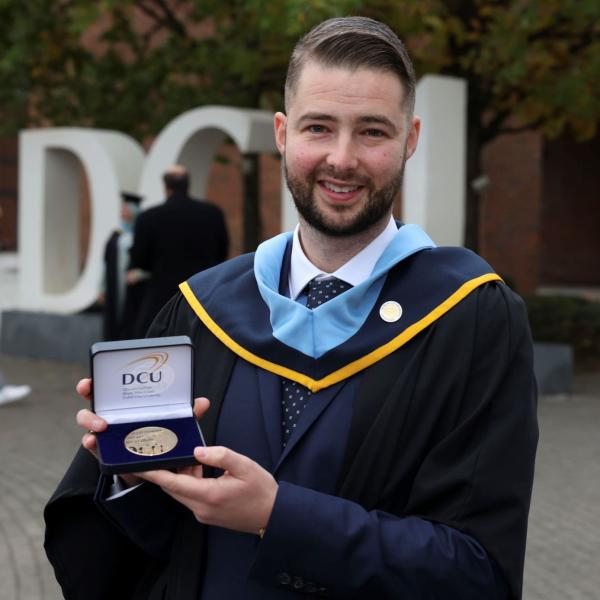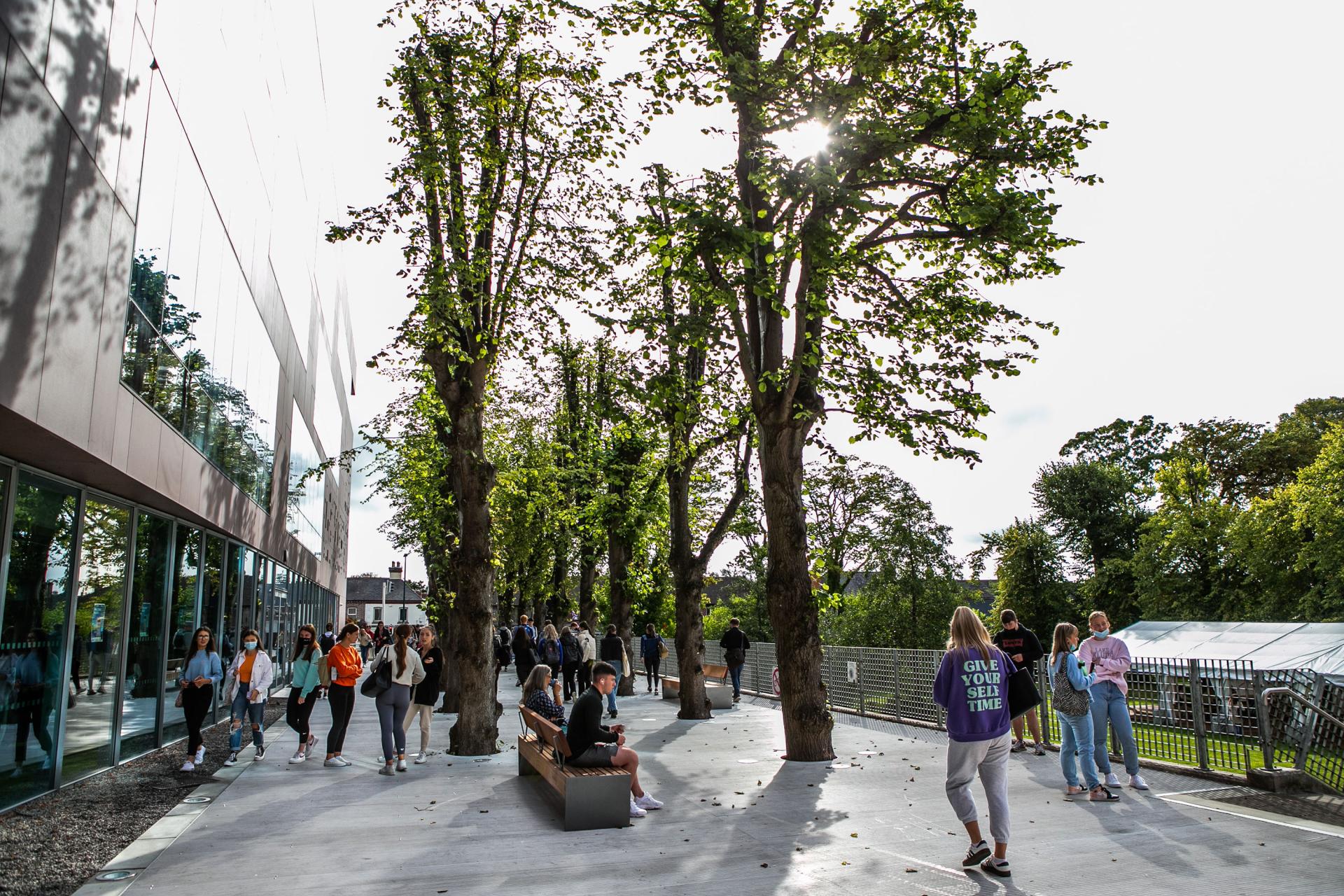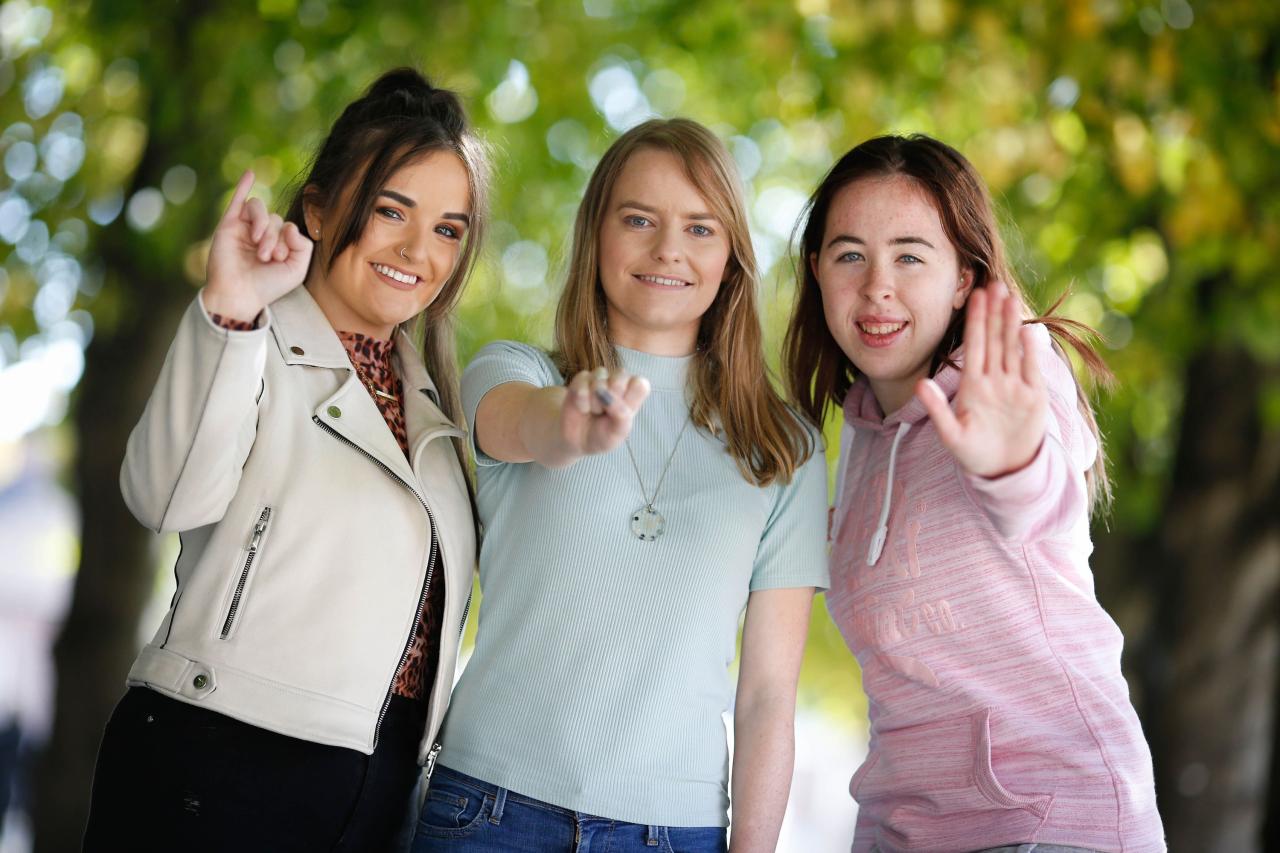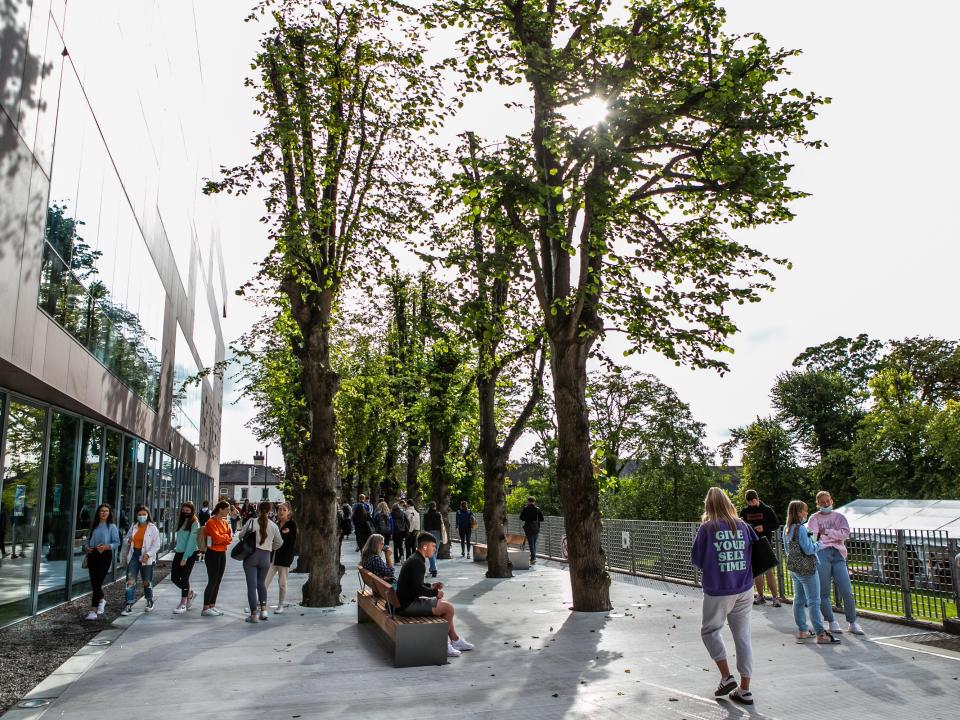Overview
The Bachelor of Education (ISL) will prepare you for a career as a Primary School Teacher in the deaf education sector where you’ll make a lasting impact on young deaf and hard of hearing children and on society.
Teaching through ISL
The course will develop your natural leadership abilities and build your communication skills. It will equip you not only with subject knowledge, but also with the tools to motivate yourself and your students in the classroom, understand how children learn, navigate the school system, and develop your classroom management abilities.
All students take Education modules and do 30 weeks School Placement. You’ll also study a specialism in deaf education.
Why DCU
DCU People

From a promising football career to becoming one of Ireland’s first ever primary school teachers using Irish Sign Language, Kevin's career path has been unconventional.
Read more about Kevin Dudley
Careers & Further Options
Careers
The BEd (ISL) degree is not only a gateway to the primary teaching profession in the deaf education sector, but also to a number of other careers related to deaf education.
- Government Departments
- National Voluntary Organisations
- Statutory Bodies
DCU graduates are highly sought after by employers. Our Graduates work in environments ranging from large multinationals to SMEs, family businesses and start-ups across every sector.
DCU Careers Service has a number of learning and development initiatives in place for our students, giving them the skills they need for a successful career path.
Entry Requirements
In addition to the general entry requirements for admission to the university the following entry requirements apply: Minimum of H5 in no fewer than three subjects and a minimum of O6/H7 in three other subjects, to include minimum of O4 or H7 in English; O4 or H7 in Mathematics.
Furthermore, your competency in Irish Sign Language will be assessed prior to entry. Competency in Irish Sign Language is a prerequisite for entry to the B.Ed ISL.
Additional Information:
Applicants will need to provide:
a) a letter from an audiologist confirming that the applicant has a significant permanent bilateral deafness (pure tone average of 41dB or above in the less deaf ear)
A person with a mild hearing loss (<41dB) is not regarded as being a suitable candidate for this programme.
OR
b) a letter from the principal of a school for the deaf/special class for deaf children in a mainstream school approved by the NCSE confirming that the applicant was enrolled in that specialist setting because of their deafness.
AND
Applicants will need to pass an Irish Sign Language competency examination (pass mark is 65% or higher at level B1 on the Common European Framework of Reference for Languages) prior to a place being offered on this programme. The competency examination will be arranged by Dublin City University."
In addition to the general entry requirements for admission to the university the following entry requirements apply: Six subjects must be presented, at least three at GCE A Level with the remaining subjects at GCE AS or GCSE Level. A subject may only be counted from only one of the examinations GCSE, GCE AS Level or GCE A Level. Applicants must present the following subject requirements: GCSE Level C in both English and English Literature or GCSE Level B in either English or English Literature. GCSE A Level D in Additional Mathematics or GCSE Level C in Mathematics. GCE A Level C in two further subjects; GCSE C in one other subject. Furthermore, your competency in Irish Sign Language will be assessed prior to entry. Competency in Irish Sign Language is a prerequisite for entry to the B.Ed ISL.
No Entry Path
No Entry Path
No Entry Path
Course Structure
In Years 1 and 2, students cover the basics needed for teaching. You will come to understand how children think and learn in active ways.
Your curriculum courses will prepare you to teach all the subjects of the primary curriculum using approaches that develop children’s understanding and motivation.
You’ll also take modules in Psychology, Philosophy Sociology of Education and History of Education.
In Year 3, you will review what you’ve learned to date and will apply it in different situations.
Your understanding of classroom contexts and of how to plan for rich learning experiences will be enriched.
You’ll learn how to work with children in ways that are democratic and enable them to engage in an ethical way with the world.
Year 4 focuses on deepening your expertise. It will provide you with opportunities to think about big ideas in education such as social justice, inclusion and working in a school community. You will also undertake a research project.
Placement
Learners spend time in schools each year, with extended placements in Years 3 and 4. You will start by observing the class teacher and will build up gradually to teaching all day.
Specialise
On the BEd (ISL), you will specialise in deaf education. In Year 1 you’ll take a module on Deaf communities, their histories and cultures. You will continue with this specialist learning in Years 2 to 4 with a number of modules on deaf education including content on sign language acquisition, audiology, assessment of children who are deaf or hard of hearing, and working with families and other professionals.
• Be taught by internationally recognised experts in primary teacher education.
• Gain experience in a broad range of classes in different types of deaf education settings.
• Take a specialism in deaf education designed to prepare you to be a leader and innovator in that field.
• Work within small groups where you'll get to know your fellow students well.
• Make an impact with an action research project as part of your final school placement.
Fees and Funding
Fees
How To Apply
No Entry Path in 2025
No Entry Path
No Entry Path in 2025
There is no advanced entry route to this programme.
Please see Application Procedures or E-mail ugadmissions@dcu.ie.
No Entry Path in 2025
Life On Campus
At DCU, our students can expect a unique campus experience. We are known for our excellent teaching and learning facilities, our active clubs and societies, and our great social and sporting facilities. All this makes DCU an exciting place to be.
DCU has three academic campuses; Glasnevin, St. Patrick’s and All Hallows (both in Drumcondra), all close to Dublin City centre.
They can be reached by public transport, Dublin Bus and Bus Éireann, with our Drumcondra campuses a ten minute walk from Drumcondra Train Station. Glasnevin is a 20 minute walk from St Patrick’s and All Hallows. They are also linked by Dublin Bus.
Each campus has a library (O’Reilly, Cregan and Woodlock Hall), study spaces, restaurants, and on-campus residencies. There are sports facilities on Glasnevin and St. Patrick’s, and there is a dedicated sports campus, St Claire’s, located near Glasnevin on the Ballymun Road.
DCU’s 19,000 students have access to exceptional teaching and learning facilities across our three academic campuses.
These include modern learning theatres, research centres, a new media and TV studio, radio/podcast studios, computer suites and advanced labs in the areas of Languages, Engineering, Physics, Chemistry and Biotechnology, as well as a Sports Performance centre and a training hospital ward. In 2021, we opened our first virtual reality ‘Leadership Lab’, which is located in our Business School.
We continue to improve and update our facilities. For example, construction of a new world-class STEM facility is underway on the Glasnevin campus. With capacity for an extra 3,000 STEM students, this facility will advance DCU’s international reputation for excellence in science and health, computing and engineering disciplines.
Studying in DCU isn’t just about course work. The university is rich in student life and activities.
There are more than 140 clubs and societies for students in DCU, with ‘Clubs & Socs’ days taking place on both the Glasnevin and Drumcondra campuses at the start of the academic year. They span everything from rugby to rock climbing, anime to jazz.
For many students, sport is an important part of the DCU experience. DCU’s Sports Complex boasts a 25 metre swimming pool, fitness centre gym, all-weather pitches and squash courts, as well as soccer, GAA and rugby pitches. DCU Dóchas Éireann, the university’s GAA club, is the largest third level Gaelic Games club in the country. Meanwhile, DCU Athletics has been Ireland’s highest achieving university club for many years. And DCU has dozens of other clubs to get involved in, from Archery to Weightlifting.
The Glasnevin campus is home to our purpose built, state-of-the-art student centre, The U, which serves the needs of a rapidly growing student body. Here, you will find the Student Leadership and Lifeskills Centre, performing arts and cultural spaces for students and the wider community, and the Entrepreneurship and Innovation Hub. Also located on our Glasnevin campus is The Helix, our renowned performing arts centre.
On our St Patrick’s campus, we have the Java Student Hub, a vibrant, warm and welcoming space where students can meet for coffee, play music, use the projector to watch events, or just relax. The walls of the Java Hub were designed based on the cultural history of St Patrick’s Campus, including the special references to the notable sporting history and history of the arts.
We have a number of academic, professional and social supports for students.
Student Advice & Learning Skills Centre - Offers a wide range of supports and services to students and advice
The Writing Centre - drop-in writing workshops for students through the academic year
Maths Learning Centre - provides maths support for students of all ability levels with maths modules
Student Learning - facilitate the transition from passive to active learning for students at DCU, by teaching study skills, nurturing critical thinking and building student confidence.
Careers work with students to help them on their professional journey into graduate employment.
Our student support team offers a comprehensive support programme, helping students make that all important transition into university life and focusing on building confidence and skills which are key to success at third level.

DCU St Patrick's Campus
FAQs
What courses are offered by the DCU Institute of Education?
DCU Institute of Education brings together students of education and provides a rich menu of undergraduate courses across all sectors from early childhood, to primary and post-primary and further and higher education. We offer a range of taught and research postgraduate courses at doctoral, masters, diploma and certificate level and have a distinguished record in providing continuing professional development.
Is there Garda vetting for students who study DCU Institute of Education courses?
Garda vetting is required for all students who have unsupervised access to children and vulnerable adults as part of their studies at DCU. Applicants must successfully pass the Garda vetting process in order to complete the registration process.
What are the potential teaching pathways for primary, post-primary and further education and training offered by DCU?
Primary Teaching Pathways
Undergraduate*
Postgraduate**
- Professional Master of Education (Primary Teaching) - DC970
* Please ensure that you consult minimum entry requirements and CAO points for all undergraduate programmes
** Please ensure that you consult minimum entry requirements for all postgraduate programmes
Post-Primary Teaching Pathways
Undergraduate*
- Bachelor of Religious Education & English or History or Music - DC010 | DC011 | DC012
- Bachelor of Education in Gaeilge and French or German or Spanish - DC013
- Bachelor of Education in Technology, Engineering and Graphics - DC015
- Bachelor of Science (Hons) in Science Education - DC203
- Bachelor of Science (Hons) in Physical Education with Biology - DC205
- Bachelor of Science in Physical Education with Mathematics - DC206
Postgraduate**
- Professional Master of Education (Post-Primary Teaching) - DC905
* Please ensure that you consult minimum entry requirements and CAO points for all undergraduate programmes
** Please ensure that you consult minimum entry requirements for all postgraduate programmes
Further Education and Training Teaching Pathways
Undergraduate*
- BSc (Hons) in Education and Training (Further, Adult and Continuing Education) - DC235
* Please ensure that you consult minimum entry requirements and CAO points for all undergraduate programmes







